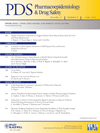
PHARMACOEPIDEMIOLOGY AND DRUG SAFETY
Scope & Guideline
Pioneering insights in pharmacological safety and efficacy.
Introduction
Aims and Scopes
- Real-world evidence and drug utilization studies:
The journal emphasizes studies that assess the use of medications in real-world settings, providing insights on prescribing patterns, adherence, and the effects of medications on various populations. - Pharmacovigilance and safety monitoring:
Research on adverse drug reactions and safety monitoring systems is a core focus, aiming to identify and mitigate risks associated with drug use. - Comparative effectiveness research:
The journal publishes studies comparing the effectiveness of different treatment options, including new therapies versus standard treatments, to inform clinical decision-making. - Methodological advancements in pharmacoepidemiology:
Papers often explore innovative methodologies for analyzing observational data, including statistical techniques for bias correction and causal inference. - Impact of regulatory interventions:
The journal frequently features studies evaluating the impact of regulatory changes on drug utilization and safety outcomes, providing critical insights for policymakers.
Trending and Emerging
- Real-world data integration:
There is a growing emphasis on integrating real-world data from various sources, including electronic health records and claims data, to inform drug safety and effectiveness assessments. - Machine learning and artificial intelligence applications:
The application of machine learning techniques for predicting treatment outcomes and identifying adverse drug reactions is rapidly trending, showcasing the potential for advanced analytics in pharmacoepidemiology. - Long COVID and its pharmacological implications:
Research addressing the long-term effects of COVID-19 and the pharmacological treatment of associated symptoms is emerging as a significant theme, driven by the ongoing pandemic. - Patient-centered outcomes and health-related quality of life:
There is an increasing focus on studies that assess patient-reported outcomes and the impact of medications on quality of life, emphasizing the need for patient-centered approaches in treatment evaluations. - Pharmacogenomics and personalized medicine:
Research exploring the role of genetic factors in drug response and the tailoring of pharmacotherapy to individual genetic profiles is gaining momentum, reflecting advances in precision medicine.
Declining or Waning
- Traditional randomized controlled trials (RCTs):
There seems to be a shift away from traditional RCTs in favor of real-world studies, as researchers increasingly focus on how drugs perform in everyday clinical settings rather than in controlled trial environments. - Basic pharmacokinetic studies:
Research centered on basic pharmacokinetics is becoming less prominent, with a growing preference for studies that incorporate pharmacogenomics and personalized medicine approaches. - Historical analyses of drug utilization:
There is a noticeable decline in papers focused on historical drug utilization trends, as the emphasis shifts toward current practices and immediate implications for patient care. - Single-drug studies:
Studies focusing on the safety and efficacy of single drugs without considering multi-drug interactions or complex treatment regimens are decreasing, reflecting a broader understanding of polypharmacy in patient populations.
Similar Journals
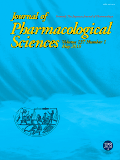
Journal of Pharmacological Sciences
Innovating drug development through impactful science.Journal of Pharmacological Sciences is a leading peer-reviewed academic journal dedicated to the field of pharmacology, published by the Japanese Pharmacological Society. Since its inception, this journal has offered an essential platform for the dissemination of high-quality research, contributing significantly to advancements in molecular medicine and pharmacology. With an impact factor that places it in the prestigious Q2 quartile for both categories, the journal has established itself as a credible source of innovative findings and methodologies since its transition to Open Access in 2015. This accessibility enables a broader audience, including researchers, healthcare professionals, and students, to engage with valuable insights and discussions pertinent to drug development, pharmacodynamics, and therapeutic strategies. Based in Kyoto, Japan, the journal serves as a vital resource for the global pharmacological community, encouraging collaboration and research that leads to improved health outcomes. For more information, submissions, and access to the latest research, visit the journal’s website.
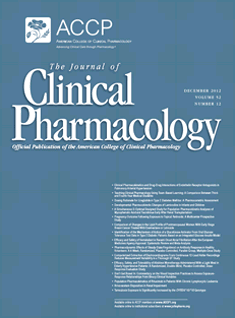
JOURNAL OF CLINICAL PHARMACOLOGY
Innovating Insights in Clinical PharmacologyWelcome to the Journal of Clinical Pharmacology, an esteemed publication in the field of pharmacology and medical pharmacology, published by Wiley. Since its inception in 1973, this journal has been at the forefront of disseminating innovative research findings and comprehensive reviews that enhance our understanding of drug therapies and their clinical applications. With an impact factor that reflects its strong reputation and a Scopus ranking placing it in the 64th percentile among 272 journals in medical pharmacology, the journal stands as a critical resource for researchers, healthcare professionals, and students alike. Although currently not an Open Access journal, it provides invaluable insights into therapeutic drug use and safety, the pharmacokinetics of drugs, and the development of new therapeutic strategies. The journal's commitment to advancing the field through high-quality, peer-reviewed articles ensures it remains a vital asset in the continuously evolving landscape of clinical pharmacology.
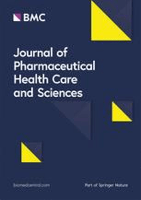
Journal of Pharmaceutical Health Care and Sciences
Empowering healthcare through cutting-edge pharmaceutical research.The Journal of Pharmaceutical Health Care and Sciences is a premier open access journal published by BMC that aims to advance the field of pharmaceutical sciences by providing high-quality research and comprehensive reviews across various domains including pharmacology, nursing, and healthcare. With an impact factor reflecting its relevance and rigor, the journal has established itself as a significant platform for disseminating knowledge since its inception in 2015. The journal is indexed in Scopus, currently holding a position in the Q3 quartile for medical pharmacology and Q2 quartile for nursing pharmacology, indicating its growing influence and reach in the scientific community. Based in the United Kingdom with a commitment to open access, the Journal of Pharmaceutical Health Care and Sciences ensures that all researchers, professionals, and students have free access to vital research that fosters innovation and improves healthcare outcomes worldwide. With a focus on collaborative and multidisciplinary approaches, the journal invites contributions that align with its objectives of enhancing health care delivery and pharmaceutical practices.
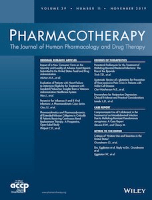
PHARMACOTHERAPY
Connecting Knowledge with Clinical PracticePHARMACOTHERAPY, an esteemed journal published by WILEY, stands as a pivotal resource within the field of medical pharmacology. With its ISSN 0277-0008 and E-ISSN 1875-9114, this journal has been at the forefront of pharmacological research since its inception in 1981. Renowned for its rigorous peer-review process and impactful contributions, it currently holds a prestigious Q1 quartile ranking in the pharmacology category, underscoring its significance as a leading publication in the field. It ranks #40 out of 272 journals in Scopus, placing it in the top 15% percentile of its category. While not an open-access publication, PHARMACOTHERAPY remains committed to advancing knowledge and understanding in pharmacological sciences, making it an indispensable resource for researchers, healthcare professionals, and students dedicated to improving therapeutic outcomes and drug utilization. Based in the United States, at 111 River St, Hoboken, NJ, the journal is poised to continue its impact through to 2024 and beyond, welcoming contributions that further the discourse in pharmacotherapy.

Safety is a prestigious Open Access journal published by MDPI, based in Switzerland, dedicated to advancing research in the fields of public health, environmental safety, and occupational health. Since its inception in 2015, the journal has become a vital resource for researchers, practitioners, and policymakers, striving to foster innovative solutions to safety challenges in various sectors. With its rigorous peer-review process and a 2023 ranking in the Q2 category for Safety Research, as well as a notable presence in public health and environmental disciplines, Safety is well-respected in academic circles, holding a Scopus rank of 37/109 in Safety Research and 87/207 in Safety, Risk, Reliability, and Quality. The journal aims to disseminate high-quality research that not only reflects the latest advancements but also aids in developing practical strategies for risk management and safety improvement. Supported by an open-access model, Safety ensures that cutting-edge research is readily available to a global audience, fostering collaboration and knowledge sharing for a safer environment.

BMC Pharmacology & Toxicology
Innovating the future of pharmacological sciences.Welcome to BMC Pharmacology & Toxicology, a premier open-access journal dedicated to advancing the fields of pharmacology and toxicology. Published by BMC since 2012, this esteemed journal offers a platform for researchers, professionals, and students to disseminate cutting-edge research and innovative findings that explore the intricate interactions between drugs and biological systems. With its robust Q2 ranking in both general medicine and pharmacology categories for 2023, BMC Pharmacology & Toxicology is recognized for its significant contributions to the academic community, reflected in its strategic positioning within the 61st and 49th percentiles in Scopus rankings for related disciplines. The journal's commitment to open access ensures that vital research is accessible to a global audience, fostering collaboration and informed discussions. We invite you to engage with the latest studies, reviews, and innovative methodologies that shape the future of pharmacological and toxicological sciences.
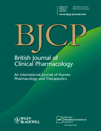
BRITISH JOURNAL OF CLINICAL PHARMACOLOGY
Championing High-Impact Research in Clinical PharmacologyBritish Journal of Clinical Pharmacology, published by Wiley, is a premier peer-reviewed journal that has been at the forefront of pharmacology research since its inception in 1974. Renowned for its high academic rigor, it stands out with an impressive impact factor that places it in the Q1 quartile within both the general pharmacology and medical pharmacology categories. With a Scopus ranking reflecting its esteemed status—ranked #68 out of 272 in medical pharmacology and #109 out of 313 in pharmacology, toxicology, and pharmaceutics—the journal serves as a critical resource for researchers, clinicians, and students who are keen to explore innovations and advancements in drug therapy. The journal's scope encompasses a wide array of topics, including clinical trials, drug safety, and pharmacokinetics, making it an essential platform for disseminating cutting-edge pharmacological findings. Although it does not offer open access, the stringent selection of articles ensures that only the highest-quality research is published, further contributing to the ongoing discourse in clinical pharmacology.

European Journal of Hospital Pharmacy
Pioneering Research for Tomorrow's Hospital PharmacistsThe European Journal of Hospital Pharmacy, published by the prestigious BMJ PUBLISHING GROUP, stands as a vital resource in the field of pharmacy, specifically focused on practices within hospital settings. With its ISSN 2047-9956 and E-ISSN 2047-9964, this journal provides an essential platform for researchers, practitioners, and students to disseminate and access high-quality research that influences clinical practice. Recognized for its significant impact, the journal has achieved a commendable Q2 ranking in both the Pharmacology, Toxicology and Pharmaceutics (miscellaneous) and Pharmacy categories according to Scopus, highlighting its status within the academic community. The journal is indexed among the top 18% in its category, showcasing innovative research and advancements in the field. While the European Journal of Hospital Pharmacy does not operate under an open-access model, its deep commitment to enhancing pharmaceutical care within European hospital settings remains undeterred. The journal also covers a converged period from 2010 to 2024, providing comprehensive insights into evolving practices and challenges. As a premier publication, it plays an essential role in education and professional development, making it indispensable for those involved in pharmacy and healthcare.
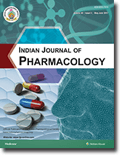
INDIAN JOURNAL OF PHARMACOLOGY
Transforming clinical practices with groundbreaking pharmacological research.INDIAN JOURNAL OF PHARMACOLOGY, published by Wolters Kluwer Medknow Publications, is a premier platform dedicated to advancing the field of pharmacology and its related disciplines. With a rich history since its inception in 1978, this journal aims to disseminate high-quality research findings, reviews, and clinical studies that contribute to the global understanding of drug action and therapeutic practices. As a valuable resource for researchers, professionals, and students alike, it operates within the Q3 quartile of the Pharmacology category, positioning itself as an influential contributor in the realm of medical pharmacology. The journal is committed to publishing rigorous scientific inquiry, fostering innovation, and bridging gaps between laboratory research and clinical application. Readers can access its wide-ranging articles to stay informed about the latest advancements in the field, reflecting its crucial role in shaping future pharmacological research and practice.
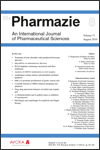
PHARMAZIE
Pioneering insights in toxicology and pharmaceutics.PHARMAZIE is a prestigious, peer-reviewed journal published by AVOXA-MEDIENGRUPPE DEUTSCHER APOTHEKER GMBH, focusing on the dynamic field of pharmaceutical science since its inception in 1947. With its ISSN 0031-7144 and a current impact factor placing it in the Q2 category of Pharmaceutical Science journals, PHARMAZIE has established itself as a pivotal resource for researchers, practitioners, and students alike. The journal emphasizes the dissemination of high-quality, original research in pharmacology, toxicology, and pharmaceutics, contributing to the advancement of knowledge and innovation in these fields. While currently not open access, the journal maintains a commendable Scopus rank of #94 out of 183 in its category, highlighting its relevance and appeal to the academic community. With a commitment to bridging the gap between research and practical applications, PHARMAZIE plays a crucial role in shaping the future of pharmaceutical practices and policies.